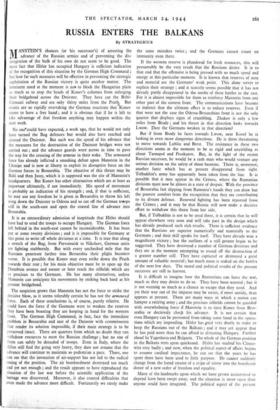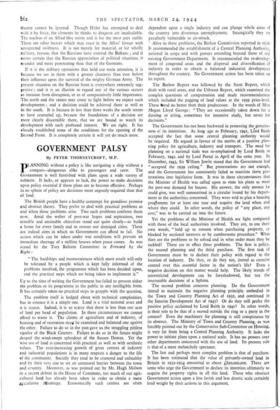RUSSIA ENTERS THE BALKANS
By STRATEGICUS No one could have expected, a week ago, that he would not only have turned the Bug defences but would also have reached and crossed the Dniester. But such was the speed of his advance that the measures for the destruction of the Dniester bridges were not carried out ; and the advance guards were across in time to pave the way for the crossing of the armour in their wake. The armoured force has already inflicted a smashing defeat upon Manstein in the Ukraine and is now at liberty to exploit its disruptive force on the German forces in Bessarabia. The objective of this thrust may be Balti and then Jassy, which it is supposed was the site of Manstein's headquarters. But Konev has other alternatives which are at least as important ultimately, if not immediately. His speed of movement is probably an indication of his strength ; and, if that is sufficient, he may use any freedom he is given in Bessarabia to throw his left wing down the Dniester to Odessa and so cut off the German troops still in the south-east and open the coastal line of advance into Bessarabia.
It is an extraordinary admission of ineptitude that Hitler should have had to send the troops to occupy Hungary. The German force left behind in the south-east cannot be inconsiderable. It has been put at some twenty divisions ; and it is impossible for Germany at this point to write off whole divisions at a time. It is true that along a stretch of the Bug, from Pervomaisk to Nikolaev, German units are fighting stubbornly. But with every unchecked mile that the Russians penetrate farther into Bessarabia their plight becomes worse. It is possible that Konev may even strike down the Pruth towards their rear ; for his main objective must be to open up the Danubian avenue and sooner or later reach the oilfields which are so precious to the Germans. He has many alternatives, unless Manstein can anticipate his movements by striking back hard at his present bridgehead.
The suspicion grows that Manstein has not the force to strike the decisive blow, as it seems tolerably certain he has not the armoured force. Each of these conclusions is, of course, purely relative. He could have the force if the Germans were to weaken the reserves they have been boasting they are keeping in hand for the western front. The German High Command, in fact, face the immediate problem in Bessarabia and east of the Dniester with commitments that render its solution impossible, if their main strategy is to be preserved intact. There are quarters from which no doubt they can withdraw resources to meet the Russian challenge ; but no one of them can safely be denuded of troops. Even in Italy, where the Allies still find the going very heavy, they dare not assume that the advance will continue to maintain so pedestrian a pace. There, one can see that the invocation of air-support has not led to the radical easing of the position. The air bombardment destroyed too much and yet not enough ; and the result appears to have reproduced the situation of the last war before the scientific application of the barrage was discovered. Moreover, it also created difficulties that even made the advance more difficult. Fortunately we rarely make
the same mistakes twice ; and the Germans cannot count on immunity even there.
If the western reserve is plundered for fresh resources, this will presumably be the very result that the Russians desire. It is to that end that the offensive is being pressed with so much speed and energy at this particular moment. It is known that reserves of men and material are the Germans' weak point. This alone serves to explain their strategy ; and it scarcely seems possible that it has not already partly disappeared in the smoke of these battles in the east. For it is almost impossible for them to reinforce Manstein from any other part of the eastern front. The communications have become so indirect that the ultimate effect is to reduce reserves. Even if that were not the case the Odessa-Bessarabian front is not the only quarter that displays signs of crumbling. Zhukov is only a few miles from Brody ; and his thrust in that direction looks towards Lwow. Dare the Germans weaken in that direction?
But if from Brody he faces towards Lwow, near Koval he is looking in even more dangerous directions. He is there threatening to move towards Lublin and Brest. The resistance in these two directions seems at the moment to be as rigid and unyielding as about Tarnopol and Proskurov. But, in the light of the recent Russian successes, he would be a rash man who would venture any serious decision on the safety of those bastions. There is, moreover, another force which has at present disappeared from sight. Tolbukhin's army has apparently been taken from the line. It is possible that it may appear in the Crimea, where the Rumanian divisions must now be almost in a state of despair. With the province of Bessarabia fast slipping from Rumania's hands they can draw but the poorest comfort from the recognition that they are contributing to its distant defence. Renewed fighting has been reported from the Crimea ; and it may be that Russia will now make a decisive effort to withdraw this thorn from her side.
But, if Tolbukhin is not to be used there, it is certain that he will appear elsewhere very soon and will take part in the design which has already produced such rich results. There is sufficient evidence that the Russians are superior numerically and materially to the Germans ; and their skill speaks for itself. They have already won a magnificent victory ; but the outlines of a still greater begin to be suggested. They have destroyed a number of German divisions and they are at the moment attempting to round off the destruction of a greater number still. They have captured or destroyed a great amount of valuable material ; but much more is staked on the battles of the next few days. The moral and political results of the present successes are still to harvest.
It is difficult to imagine how the Rumanians can leave the war, much as they may desire to do so. They have been warned ; but it is not warning so much as a chance to escape that they need. And yet their way out of the impasse may be easier, if more untidy, than appears at present. There are many ways in which a nation can hamper a retiring army ; and the precious oilfields cannot be guarded with overwhelming force if Manstein is to eject Konev from Bess- arabia or decisively check his advance. It is not certain that even Hungary can be prevented from taking some hand in the opera- tions which are impending. Hitler has paid very dearly in order to keep the Russians out of the Balkans ; and it may yet appear that he has paid more than he can afford in alienating Hungary. Further ahead lie Yugoslavia and Bulgaria. The whole of the German position
in the Balkans rests upon quicksand. Hitler has studied. his Clause- witz very badly ; and now, when the political aspect of affairs begins
to assume cardinal importance, he can see that the years he has spent there have been used to little purpose. He cannot suddenly change from the hated creator of a reign of terror into the beneficent donor of a new order of freedom and equality.
Many of the landmarks upon which we have grown accustomed to depend have been swept away, and the situation is more open than anyone could have imagined. The political aspect of the present theatre cannot be ignored. Though Hitler has attempted to deal with it by force, the elements he thinks to dragoon are incalculable. The nucleus of an Allied bloc exists and is for the most part stable. There are other factors which may react in the Allies' favour with unexpected swiftness. It is not merely for material, or for wholly military, reasons that the Russians have entered the Balkans ; and it seems certain that the Russian appreciation of political situations is sounder and more penetrating than that of the Germans.
If it is the military operations that hold our main attention, it is because we see in them with a greater clearness than ever before their influence upon the survival of the mighty German Army. The present situation on the Russian front is everywhere extremely sug- gestive ; and it is an illusion to regard any of the various sectors as immune from disruption, or as of comparatively little importance. The north and the centre may come to light before we expect such developments ; and a decision could be achieved there as well as in the south. It is because in less than three weeks the south seems to have crumpled up, because the foundations of a decision are more clearly discernible there, that we are bound to watch its development with such profound interest. We are right. It has already established some of the conditions for the opening of the Second Front. It is completely certain it will yet do much more.



























 Previous page
Previous page